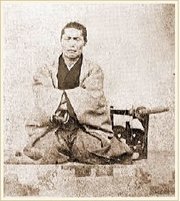Kondo Isami
|
|
Kondo Isami (近藤 勇 Kondō Isami, 1834 - 1868) was a chief of the Shinsen-gumi, an armed special security team in Kyoto during the late shogunate period. He was born from a farmer family in Tama near Edo (now Tokyo). His life was driven by the desire to be a samurai during the Edo period when there was a strict hierarchy of the class system making it difficult for him to be accepted as a samurai because he was born in the farmer class.
In 1863, he joined the Roshigumi with Hijikata Toshizo, Yamanami Keisuke and Okita Soji. After the founder of Kiyokawa Hachiro dismissed the company, they remained in Kyoto with Hijikata and Aizawa and formed Miburo Roshigumi. They were put under the control of Aizu clan with the job of Kyoto Shugoshoku and worked as police in Kyoto. In an August 18 incident Kinmon no Seihen, his team was renamed Shinsengumi. In June 1864, the Shinsengumi became well known for arresting extreme cells (Ikedaya Affair).
In January 1868, at the Battle of Toba-Fushimi, he returned to Edo, fighting with the force dispatched by the Imperial Court but lost the battle. After surrendering, he was caught on April 25 and his neck was displayed in Sanjo beach of Kyoto. He was beheaded and he was not allowed to perform seppuku as a samurai for being born a farmer.

